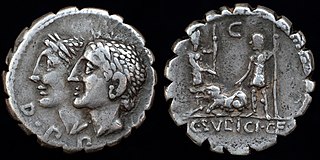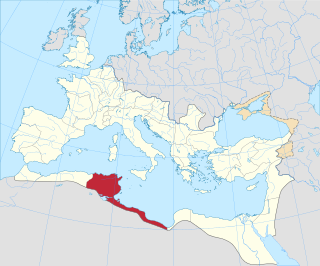Related Research Articles
Year 188 (CLXXXVIII) was a leap year starting on Monday of the Julian calendar. At the time, it was known as the Year of the Consulship of Fuscianus and Silanus. The denomination 188 for this year has been used since the early medieval period, when the Anno Domini calendar era became the prevalent method in Europe for naming years.

In ancient Roman religion, the Di Penates or Penates were among the dii familiares, or household deities, invoked most often in domestic rituals. When the family had a meal, they threw a bit into the fire on the hearth for the Penates. They were thus associated with Vesta, the Lares, and the Genius of the paterfamilias in the "little universe" of the domus.

Pertinax was a Roman soldier and politician who ruled as Roman emperor for the first three months of 193. He succeeded Commodus to become the first emperor during the tumultuous Year of the Five Emperors.

Dionysius of Halicarnassus was a Greek historian and teacher of rhetoric, who flourished during the reign of Augustus Caesar. His literary style was Atticistic—imitating Classical Attic Greek in its prime.
The name Dionysius was common in classical and post-classical times. Etymologically it is a nominalized adjective formed with a -ios suffix from the stem Dionys- of the name of the Greek god, Dionysus, parallel to Apollon-ios from Apollon, with meanings of Dionysos' and Apollo's, etc. The exact beliefs attendant on the original assignment of such names remain unknown.

Germania Superior was an imperial province of the Roman Empire. It comprised an area of today's western Switzerland, the French Jura and Alsace regions, and southwestern Germany. Important cities were Besançon (Vesontio), Strasbourg (Argentoratum), Wiesbaden, and Germania Superior's capital, Mainz (Mogontiacum). It comprised the Middle Rhine, bordering on the Limes Germanicus, and on the Alpine province of Raetia to the south-east. Although it had been occupied militarily since the reign of Augustus, Germania Superior was not made into an official province until c. 85 AD.

Africa Proconsularis was a Roman province on the northern African coast that was established in 146 BC following the defeat of Carthage in the Third Punic War. It roughly comprised the territory of present-day Tunisia, the northeast of Algeria, and the coast of western Libya along the Gulf of Sirte. The territory was originally inhabited by Berber people, known in Latin as Mauri indigenous to all of North Africa west of Egypt; in the 9th century BC, Phoenicians built settlements along the Mediterranean Sea to facilitate shipping, of which Carthage rose to dominance in the 8th century BC until its conquest by the Roman Republic.
Avienus was a Latin writer of the 4th century AD. An inscription from Bulla Regia, a former Roman city located in modern-day Tunisia, reports his full name as "Postumius Rufius Festus who is also Avienius". He was a native of Volsinii in Etruria, from the distinguished family of the Rufii Festi. He was twice appointed consul, if an inscription published by the 17th-century antiquaries Jacob Spon and Raffaello Fabretti really refers to this Avienus.

A proconsul was an official of ancient Rome who acted on behalf of a consul. A proconsul was typically a former consul. The term is also used in recent history for officials with delegated authority.

The Temple of Jupiter Optimus Maximus, also known as the Temple of Jupiter Capitolinus was the most important temple in Ancient Rome, located on the Capitoline Hill. It was surrounded by the Area Capitolina, a precinct where numerous shrines, altars, statues and victory trophies were displayed.
Quintus Aelius Tubero was a Roman jurist, statesman and writer. He may have been a Roman consul with Paullus Fabius Maximus in 11 BC.
Quintus Junius Blaesus was a Roman novus homo who lived during the reigns of Augustus and Tiberius. He was the maternal uncle of Lucius Aelius Sejanus, the Praetorian Prefect of Emperor Tiberius.
Aelius Dionysius was a Greek rhetorician from Halicarnassus, who lived in the time of the emperor Hadrian. He was a very skillful musician, and wrote several works on music and its history. It is commonly supposed that he was a descendant of the elder Dionysius of Halicarnassus, author of Roman Antiquities, a history of Rome from its founding to the middle third century BCE. He was one of the teachers of Alexander Peloplaton.
Paullus Fabius Maximus was a Roman senator, active toward the end of the first century BC. He was consul in 11 BC as the colleague of Quintus Aelius Tubero, and a confidant of emperor Augustus.
Anthypatos is the translation in Greek of the Latin proconsul. In the Greek-speaking East, it was used to denote this office in Roman and early Byzantine times, surviving as an administrative office until the 9th century. Thereafter, and until the 11th century, it became a senior Byzantine court dignity.
The gens Galeria was a Roman family of Imperial times. The family first rose to prominence under the Julio-Claudian dynasty, but the most illustrious person of the name was the emperor Galerius, one of the heirs of Diocletian, who reigned from AD 305 to 311, although he cannot have been a direct descendant of the earlier family.
The gens Helvia was a plebeian family at ancient Rome. This gens is first mentioned at the time of the Second Punic War, but the only member of the family to hold any curule magistracy under the Republic was Gaius Helvius, praetor in BC 198. Soon afterward, the family slipped into obscurity, from which it was redeemed by the emperor Pertinax, nearly four centuries later.
Spurius Furius Medullinus Fusus was a Roman politician in the 5th century BC, and was consul in 464 BC, and consul suffect in 453 BC.

Nashan is the name of an ancient South Arabian city in the northern al-Jawf region of present day Yemen, in the territory of the ancient Kingdom of Ma'in. The city was called Nestum in the Natural History book that was written by Pliny the Elder.

The gens Publicia, occasionally found as Poblicia or Poplicia, was a plebeian family at ancient Rome. Members of this gens are first mentioned in history during the period following the First Punic War, and the only one to achieve the consulship was Marcus Publicius Malleolus in 232 BC.
References
- ↑ J. C. Coulston; Hazel Dodge (2000). Ancient Rome: the archaeology of the eternal city. Oxford: Oxford University School of Archaeology. p. 136. ISBN 978-0-947816-54-4.
- ↑ Ghisalberti, Carlo (1998). Il Senato nella storia: Il Senato nell'età romana. Roma: Istituto poligrafico e Zecca dello Stato. p. 266.
- ↑ "Proconsuls of Africa, 337-392", Phoenix, 39 (1985), pp. 144-153